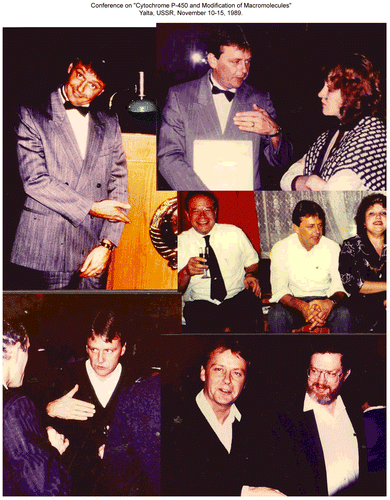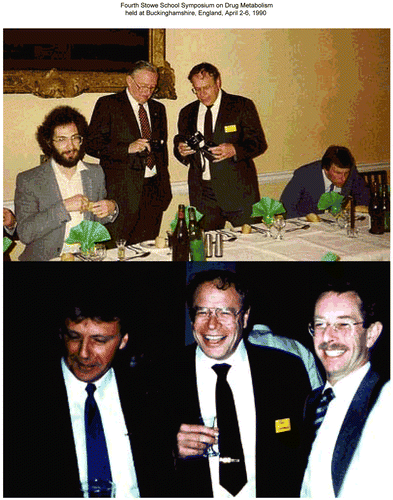Copy of the obituary that appeared in the ISSX Newsletter, June 2008
ISSX and the world of science recently lost a good friend and supporter. Dr G. Gordon Gibson, BSc, PhD, DSc, FRCPath served as Professor of Toxicology and Leader of the Molecular Toxicology Group of the School of Biomedical and Molecular Biosciences, University of Surrey, Guildford. He passed away on Thursday, May 22, 2008 in his home at Godalming, UK. His funeral was held in Polmont South Church (where Gordon was married) at Brightons, Stirlingshire, in his Native Scotland on June 2. He was interred at the Grand Sable Cemetery in Brightons. Those who knew Gordon remember his zest for life and his boundless energy and enthusiasm for science, students, travel, and love for his family. Those of us who traveled the world attending meetings with Gordon can regale you with many stories of his antics in Yalta, Stowe School, San Diego, and numerous other venues. Gordon loved to tell about his latest experiments and the new directions his laboratory was taking in understanding the molecular regulation and function of CYPs of the Class 4 type. In recent years he dedicated his energy to work on CYP3A4.
But Gordon is best known for his leadership as Editor of Xenobiotica. Gordon was a central player in the dealings that resulted in keeping Xenobiotica close to ISSX. He was an honest and fair editor often encouraging new authors and chiding old veterans to higher levels of accomplishment. His many years of work as an Editor will remain a lasting memorial to his career. Lastly, Gordon was a splendid host for those who visited the University of Surrey. His wife Katrine (Tricia) and their daughters Kirstie and Fiona have suffered a major loss. Our thoughts and prayers are with them. Gordon will be missed by many friends and colleagues.
written by Ron Estabrook
February 22, 2009
Letter
Dear Gordon:
It has been almost a year since you left us. Time goes by swiftly and you have been missed. Science continues to progress toward it’s never ending search for the “magic bullets” that will keep us all in good health.
Costas Ioannides has taken over your responsibilities as Editor of Xenobiotica. One of his fist tasks was to organize an issue of Xenobiotica to honour and remember you. When Costas first approached me about writing an article for this volume I suggested the title “Gordon Gibson - the bon vivant of P450 research”. I thought this was a clever title and would reflect my memory of you as a dynamic, spirited, and fun-loving “people person”. As I turned my attention to writing the article I realized that it would be more fitting (and unusual) to write you a personal letter expressing my feelings. Since I have a large inventory of pictures I’ve taken of you at various science meetings, I have selected to highlight two memorable meetings that you and I both attended.
In 1989 Alex Archakov invited Bill Peterson and myself to attend a meeting in Yalta sponsored by the National Biochemical Society of the USSR and the Crimean Medical Institute of the Ministry of Health, Yalta, USSR. This meeting was held November 10-15, 1989. Although both Bill and I had been to Russia numerous times, we had never been to Yalta (a famous site in the history of the United States and Great Britain at the end World War 2). The topic of the meeting was on “Cytochrome P-450 and Modification of Macromolecules”. Bill and I debated going to this meeting. Finally we said “No problem, let’s go – another travel adventure.” We were rewarded for our efforts. Although we arrived in Moscow to find subzero temperatures, Yalta was an idyllic paradise on the Black Sea. Our hotel, the “Yalta”, was a 1600 room Russian structure sitting on a beautiful beach at the edge of the city Yalta. This location gave us the opportunity to explore many exciting sites and see how the people live in the south of Russia. In spite of the newness of the scenic experience of visiting Yalta, the quality of the science presented at the meeting made the trip a worthwhile experience. I have two vivid recollections of the meeting. First is the costume you wore for your presentation of your lecture titled “The cytochrome P450 IVAI gene structure, regulation and toxicological significance”. As shown in (top pictures) you wore a tuxedo-like suit and black bowtie. This outfit was a great hit with the audience. Recently I read the wonderful Obituary for you written by your good friend, Peter Goldfarb (http://www.surrey.ac.uk/fhms/divisions/biochemistry/gordongibson.htm). In this article, Peter describes your PhD training at the University School of Pharmacy in Chelsea with Arnold Beckett. Peter states “At this time the King’s Road was also a centre for fashion which may explain Gordon’s reputation for being a smart and snappy dresser”. Of course, the highlight of the meeting was the banquet. Well, not the banquet, per se, but rather the party after the banquet.
The second occasion that I remember from the meeting in Yalta was the party held in John Schenkman’s hotel room following the banquet (I think that is where the post-banquet festivities were held – see the center picture in ). The Russians are notorious for their hospitality and generosity – in particular the vast quantities of vodka provided. We all had had a large amount to drink. The air was full of broken Russian-English and English-Russian conversations. It was boisterous party with frequent loud bursts of laughter. Comradeship was at its peak (Do you remember the young lady at your left in the picture?). Many of us left this party early since we had our plane flights in the early morning.
The next morning I opened my hotel room door to go to breakfast, and there you were wrestling your bag down the hall to the elevator. You were pale and sweat was streaming down your face. I realized that you had not left the party early the night before (see the photos at the bottom of with Bill Peterson). The meeting in Yalta is a meeting that many people remember.
The second meeting I vividly recall was the Fourth Stowe School Symposium on Drug Metabolism held at Buckinghamshire, England, April 2-6, 1990, in which you played a key role as the organizer for the UK Drug Metabolism Group. You had kindly invited me to give a Plenary Lecture and the banquet speech. Most important, you had also arranged that I be assigned the Nurses Quarters for sleeping (a warm and comfortable room but a long way from the cellar bar and the center of evening activities). I was not a stranger to Stowe School, since I had attended the First Stowe School Symposium on Drug Metabolism.
Most impressive was watching you as the leader of this meeting. You had many responsibilities and you did them with your normal efficiency, charm and patience (see and ) (The yellow windbreaker was your symbol of authority). This impressed me. But I was most influenced by the devotion, respect and love of you by your students, I remember going as a group to one of the local pubs with the you and your students and the great fun we had telling stories about Gordon Gibson, You were a wonderful mentor with a keen involvement with your young people – and they appreciated it. You can see in and pictures I took of you and your students at the statue in front of the entrance to Stowe School and in the cellar pub (with Andrew Parkinson in his red sweater).
The highlight of Stowe School meetings is the evening banquet held on the last night. shows an activity prior to serving the dinner. John Schenkman and I are discussing the topic of my lecture while Alan Boobis prepares to start his dinner – but look at Gordon (right side of the picture) hurriedly eating so he carry out his duties as Master of Ceremony for the banquet. After the banquet lecture we celebrated the success of the meeting with John Schenkman and Peter Goldfarb (). It was obvious that you were relieved to finish your duties as organizer. Congratulations for a job well done and a meeting enjoyed by all.
Before finishing this letter I want to discuss the pictures shown in . These are a few additional pictures I recently found. The top left picture is Tricia taken in California at the ISSX meeting in San Diego that I organized. This was the first ISSX meeting where we had pre-meeting workshops and you gave a brilliant lecture on the “Role of Molecular Biology for the Study of P450”. This picture was taken almost 20 years ago. On the top right is a picture of you with David Kupfer when we enjoyed the hospitality of the Janssen Pharmaceutical Co. in Belgium. At the bottom of is a special picture from the Stowe School meeting where you are showing your affection for Andrew Parkinson. I concur.
Gordon, I am struggling with the question of how to end this letter. I remember the very kind letter you sent me on my retirement as Professor of Biochemistry. In that letter you quoted an “ancient Scottish blessing”:
“May the road rise up to meet you.
May the wind be always at your back.
May the sun shine warm upon your face;
The rain falls soft upon your fields and until we meet again.
May God hold you in the palm of his hand.”
You have so many friends and you have done such good science that it would take many more pages to touch on all your outstanding qualities. You have left a wonderful family who mourns your loss. You are still remembered as the “bon vivant” of P450 clan.
God bless you.
Your friend,
Ron Estabrook




